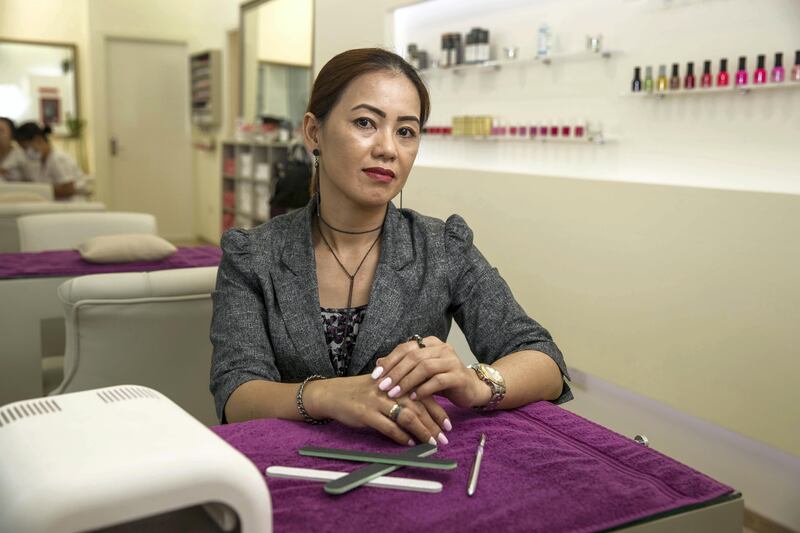Beauty salon customers may take home more than perfectly polished nails after a manicure and pedicure as doctors warn women of the dangers of infections from improper sterilisation of nail equipment.
Numerous salons across the country have been warned or closed by authorities for not abiding by health and safety regulations and doctors say women need to be more knowledgeable and proactive when it comes to salon safety if they want to avoid bacterial, fungal or viral infections.
A public health and preventative medicine specialist said that using non-sterilised nail tools and foot baths may inadvertently lead to exposure to fungus, hepatitis B and C, and a number of different infections.
“The most worrying health risk at a nail salon is injuries that lead to infection. Nail tools are being used on more than one customer and, if not properly disinfected and sterilised, it might get contaminated with other customer’s blood when wounds or cuts occur during the treatment,” said Dr Yusra Abo Hamed.
“If the customer is infected with any of blood-borne infections, like hepatitis B, hepatitis C, it might transfer easily to another customer.
“The viruses can enter through a small cut or scratch in the skin when an infected tool is used. Without proper disinfection, these infectious agents may stay active for … up to two weeks.”
Read more: Salon user learnt peril of pedicure the hard way
Poor tool hygiene can also lead to fungal infections, she said.
“To stop spreading fungal infection in salons, the first thing that should be done is to ask the staff about the steps they use to disinfect and sterilise the tools and preferably see them implement it.
“And people who think they may have a fungal infection need to get their conditions treated by a specialist.”
Maryam Al Ali is in an ideal position to comment on hygiene in salons as she is both a chief nursing officer and owner of Melody nail salon in Fujairah. She also stressed the importance of sterilising.
“Salons should have a plan to implement a hospital-grade protocol for disinfecting and sterilising the used tools and equipment,” she said.
“I see many beauty salons that poorly disinfect their tools and sometimes they don’t, which leaves the client at risk of catching a skin or nail infection.”
At her salon, Ms Al Ali said they don’t offer services to clients who have skin problems or nail infections.
“We apologise to clients who suffer from infections and advise them to come back after recovery and soon we will start offering personal nail tools to be purchased and kept by clients,” she said.
Read more: Nearly 20,000 warnings for unhygienic practices at beauty salons
Current health regulations in the UAE stipulate that nail tools should be cleaned with a brush, soap and warm water then dipped in disinfectant and placed in an “autoclave”, a steam sterilising device.
“Limiting the disinfecting process to only wiping tools with disinfectant is not enough and can cause infections,” said Dr Abo Hamed, who suggested taking your own tools to the salon or even using disposable equipment.
A dermatologist said she receives many patients with nail or toenail infections and they don’t realise that it could be the salon that is behind their infection.
“We can’t say it’s a phenomenon but it’s something every woman should be aware of, and precautions should be taken,” said Dr Farah Al Ansari.
“Although it’s hard to determine from where the patient got the infection, we ask about their daily routine and many become surprised to know that beauty centres can be one of the options.”
Changes to the colour of the nail, pain, tenderness and swelling around the infected area can be signs of a nail infection, Dr Al Ansari added.
Paronychia is the most common nail infection that can be transmitted during a mani and pedi, along with fungal infections, warts, MRSA and Mycobacterium fortuitum.
The owner of Ivy Nail Spa in Dubai said her staff adhere to health and safety rules and also ensure customers are free from infection.
Read more: Safety in the salon - does your salon follow proper hygiene rules?
“We ask them if they have health issues that might affect their skin or nails and we do their nails very carefully and slowly, to avoid cutting of skin or cuticles,” said Ivy Maranan.
“Staff must wash and disinfect their hands and their tools before they touch the client, as well as wash the hands and feet of the client, to avoid contamination and transmitting infections.”
Health inspectors have a hard time as they have no specific way on the spot of determining if equipment is sterile or not but officials say they look at the overall condition of the salon.
“We mainly check the salon licence, cleanliness of the place, availability of the sterilising devices and disinfectant solution, the staff occupational health cards and personal hygiene along with product expiry dates,” said Fatima Al Mukasah, head of public health department at Fujairah Municipality.
Health and safety is also taken seriously at Dubai Municipality, which announced in July plans to start a health supervisor training programme for 3,600 salon and beauty centre workers. The idea came about after inspectors found a lack of awareness of the causes of transmission of infectious diseases and lack of knowledge on health and safety when inspecting salons.
In Abu Dhabi in August, 31 offences were registered and 42 warnings were issued to beauty parlours and hair salons in Mussaffah alone over poor hygiene.
Abu Dhabi Municipality said that the cases followed 541 inspection visits and that in April seven beauty parlours in Abu Dhabi were referred to court for falling short on health standards.





